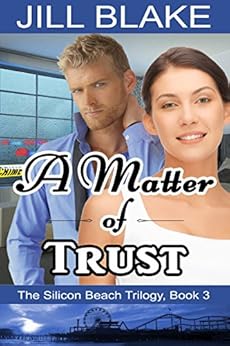The inspiration comes from fragments of real life and issues that would otherwise keep me up at night. Since I really need my sleep, I transform these "problems" into fodder for my books.
The 99% perspiration starts with carving out dedicated time for writing. That’s when I do the "foundational work" of research and outlining. I prepare character sketches, chapter-by-chapter outlines, timelines (on an actual calendar!), and individual files for background information (aka research)–all before I even begin chapter one.
My latest book, A Matter of Trust, is the third book of my Silicon Beach Trilogy. I wanted to tell a story about the younger siblings of characters from the previous two books. The problem was that my hero, Vlad, was kind of a jerk when he first appeared in book two. The need to rehabilitate him led to the central conflict of the story. Klara witnesses Vlad’s bad behavior, and this makes her doubt his integrity. Layer on a murder in which he becomes a suspect, and all of a sudden it becomes quite interesting…
I write romance because I enjoy exploring the relationships between people. I love throwing together seemingly incompatible characters and making them work through their differences. In my books, nothing comes easily, but the happy ending makes it all worthwhile—for me, and hopefully for my readers as well.

A Matter of Trust
(The Silicon Beach Trilogy, Book 3)
by Jill Blake
Venture capitalist Vlad Snezhinsky excels at two things: making money and being a dad. Still struggling to get over a disastrous marriage, he has zero interest in starting a new relationship. That is, until he meets Klara Lazarev.
Klara’s done living in her older sister’s shadow. Determined to forge her own path, she completes a prestigious fellowship program before returning to college. Now scrambling to fulfill her graduation requirements, she has no time for distractions like Vlad and his daughter. Especially after an unfortunate first encounter leaves Klara doubting Vlad’s integrity.
But when a shocking murder throws their world into chaos, can they trust each other enough to uncover the truth and embrace the possibility of love?
Excerpt
Vlad hunkered down at the edge of
the mat. "Okay, let's try this again," he said, stretching out his
hand. "My name is Vlad. And you are…?"
"Klara. Anna's sister."
She withdrew her fingers as quickly as possible, but not before he felt the
slight tremor.
Nerves? Attraction? She averted
her eyes, focusing on the baby. The pulse at the base of her neck fluttered.
He swallowed a smile. "So,
Klara. Why haven't we met before?"
That got her attention. And not
in a good way. Her brows drew together and she narrowed her eyes. "We
have. A couple years ago, at your brother's wedding."
"Oh." He blinked away
the unpleasant memories that threatened to swamp him. It was unfortunate that he'd
forever associate Leo's wedding with the beginning of the end. That's when Vlad
and Oksana started on a long downward spiral, culminating in an acrimonious
divorce that was still dragging on today.
He studied Klara more closely.
Something stirred at the back of his mind.
A brief impression of thick black
curls swept up in an elegant twist, the body poured into some barely-there
excuse for a dress, the lips smiling at him. And then—
Oh, God.
The red lipstick smeared, the
eyes dripping mascara-tinged tears, his cheek stinging from the impression of
her hand.
And then—nothing.
He couldn't recall a goddamn
thing until he woke up the next morning, head pounding like an entire battalion
of jackhammers doing demolition work.
ABOUT Jill Blake
A native of Philadelphia, Jill Blake now lives in southern California with her husband and three children. By day, she works as a physician in a busy medical practice. By night, she pens steamy romances.
Twitter https://twitter.com/Jill_Blake_













.jpg)
